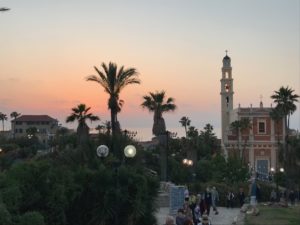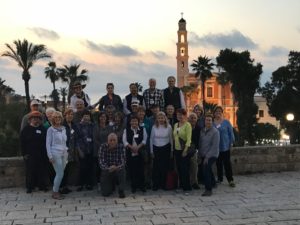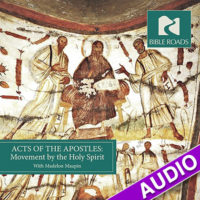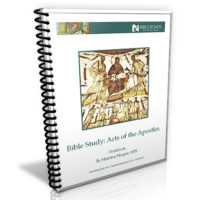One of the wondrous things of landing at Tel Aviv’s shiny, modern airport is being transported to an ancient Biblical site within thirty minutes of clearing customs.

Joppa at sunset over Mediterranean with St. Peter’s Church on right.
On a recent trip we did just that – left Ben Gurion airport for ancient Joppa, the southern part of a 1st century C.E. (Common Era) port city, now Tel Aviv. Walking up to the city’s Acropolis provided a spectacular sunset view that verified why the site was named Jaffa or Joppa (today called Yaffo), meaning lovely or pretty. Looking out to the Mediterranean, we had our first look at the Franciscan “St. Peter’s Church”, built over a medieval citadel from the 13th century, dedicated to when the disciple visited Simon the Tanner.
Acts 10 tells us the story, first opening with the appearing of an angel to Cornelius, the Italian centurion who will become a sign of the ever-widening ministry of the early Church beyond the Jews. As “a devout man” (Acts 10:2) who both generously gave to the people and prayed constantly to God, he was an example of the spiritual hunger among Gentiles drawn to the monotheism of Judaism. Such seekers were called “God-fearers”. Little did Cornelius know his faith would play a key role in the unfolding development of Christianity, teaching the disciple upon whom Jesus said his church would be built, a life-changing lesson in Christian inclusion.
No one — not Jew nor Gentile — is excluded from God’s all-encompassing love. All are welcome to experience this great love, explained by Jesus as the Kingdom of Heaven already come. As he directed his disciples when he sent them out: “Don’t begin by traveling to some far-off place to convert unbelievers. And don’t try to be dramatic by tackling some public enemy. Go to the lost, confused people right here in the neighborhood. Tell them that the kingdom is here. Bring health to the sick. Raise the dead. Touch the untouchables. Kick out the demons. You have been treated generously, so live generously” (Matt. 10:6,7).
Back to Acts, the angel directs Cornelius to send men to Joppa to retrieve Peter, who is ‘lodging with Simon, a tanner, whose house is by the seaside’ (Acts 10:6). Acts is full of the Holy Spirit bringing disparate parties together, and this story in Acts 10 is the second account of holy pairing to further God’s purpose. (The first appears in Acts 8, about Philip meeting and baptizing the Ethiopian Eunuch.)
The author of Acts, (thought to be the Luke, the writer of the Gospel), is a compelling storyteller and the scene shifts to Simon’s home. We’re told Peter has gone up on the roof to pray. Why? While the text doesn’t say, archaeologists discovered that ancient tanners used urine in their work for the curing of leather. One would have known exactly where Simon lived by the smell! Under such circumstances, going on the roof to pray while getting some fresh seaside air makes sense.
It is this prayer in which Peter is told three times to let go of the kosher dietary laws he has practiced throughout his life (Acts 11). They won’t have a place as the Gentile world learns the message of grace and love embodied in Christ Jesus’ teachings and will increasingly embrace. “I truly understand that God shows no partiality, 35 but in every nation anyone who fears him and does what is right is acceptable to him” (Acts 9:34).
The Hebrew Scriptures names this port city as well: when Jonah decides to flee from God’s directive to save the people of Nineveh. It is Joppa where he catches the boat to Tarshish, in today’s Spain, and one of the remotest parts of the Roman Empire. That this only Old Testament parable cited Tarshish for Jonah’s new destination would have been an obvious object lesson to early listeners – knowing that it was the most opposite direction of Nineveh one could find!
The book of Acts also tells us the faithful disciple, Tabitha, lived in Joppa. Always taking care to balance experiences of both male and female disciples, Luke tells Tabitha’s encounter with Peter just prior to his stay at the house of Simon. Dorcas (Tabitha’s name in Greek) had died, Acts 9 explains. Having heard that Peter was in the nearby town of Lydda, two men were sent to bring him to Tabitha’s bed side.
Pause and consider what this group of new converts to Christ Jesus’ teachings believed: that just as Jesus’ had raised Lazarus from the dead and himself had been resurrected, they must have reasoned that death could not have been this woman’s final chapter. They were learning to challenge the most common and aggressive view of humanity’s end – death – and say, no. Life is here, right where this body appears. When Peter came to Tabitha, he proved them right, raising her from the dead and ‘calling the saints and widows, he showed her to be alive” (Acts 9:41).
It’s no wonder that he stayed in Joppa ‘for some time’ at Simon’s home, probably preaching and continuing to share and heal with the powerful message of Christ Jesus’ teachings that the Kingdom of heaven has indeed arrived and is among us.

Modern day pilgrims on Joppa’s ancient Acropolis.
Sometimes searching a Biblical location and seeing all that happened there is a marvelous way to ground ourselves in the stories. Joppa gives us three powerful examples of the spiritual lessons the Scriptures reveal (Cornelius, Tabitha and Jonah). No doubt we will never see it again as only an ancient site–as this group of Pilgrims can attest.




This is so interesting, inspiring and relevant. I so appreciate your Bible Roads emails and shared this with 4 others. Thank you.
I was told by an Israeli guide that Joffa was founded by Noah’s son, Japheth, and Mrs Eddy’s definition of Japheth has that sense of inclusion, “flowing from the understanding that God is the divine Principle of all existence, and that Man is His idea, the child of His care.” (Science and Health, p. 589). Flowing, all existence, and child of His care seem to include everyone. I’ve also read that in the past, folks divided up Noah’s sons by ethnicity, and Japheth represented the Gentiles. (Gen 10: 2, 5 – “The sons of Japheth…By these were the isles of… Read more »
What a beautiful place! And thanks, Madelon, for increasing my understanding of its significance. [Looks like a great group as well!]
How grateful I am to have been there as the sun set on the Mediterranean, as our first stop on an incredible trip to the Holy Land. This was not a vacation! It was an amazing life-changing learning experience. The Bible has been opened-up for me and our group of travelers.
Jim and I were inspired again as we read this blog. We will never forget the amazing awakening that began to take place during this sunset visit to Joppa with you.
Jim learned from his Masonic work that this was also the port that received the great timbers sent to Jeruselum to build Solomon’s temple.
Thanks for turning us to the Bible with greater love and appreciation.